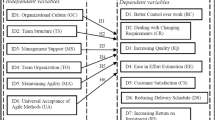Abstract
Agile methods have become more popular since the early 2000s and, in some cases, can offer better results for software development projects when compared to traditional approaches. Agile methods promise to achieve high productivity and to deliver high-quality software, attracting the attention of companies, which demand ever-higher development speed and quality in their products.
Access this chapter
Tax calculation will be finalised at checkout
Purchases are for personal use only
Similar content being viewed by others
References
Dybå, T., Dingsoyr, T.: Empirical studies of agile software development: A systematic review. Information and Software Technology 50(9-10), 833–859 (2008)
Ramírez, Y.W., Nembhard, D.A.: Measuring knowledge worker productivity: A taxonomy. Journal of Intellectual Capital 5(4), 602–628 (2004)
Trendowicz, A., Münch, J.: Factors influencing software development productivity - state-of-the-art and industrial experiences. Advances in Computers 77, 185–241 (2009)
Petersen, K.: Measuring and predicting software productivity: A systematic map and review. Information and Software Technology (2010) (in press)
Gerring, J.: Case Study Research: Principles and Practices. Cambridge University Press, Cambridge (2006)
Glaser, B.G., Strauss, A.: The Discovery of Grounded Theory: Strategies for Qualitative Research. Aldine Transaction (1967)
Author information
Authors and Affiliations
Editor information
Editors and Affiliations
Rights and permissions
Copyright information
© 2011 Springer-Verlag Berlin Heidelberg
About this paper
Cite this paper
de O. Melo, C., Kon, F. (2011). Empirical Evaluation of Agile Practices Impact on Team Productivity. In: Sillitti, A., Hazzan, O., Bache, E., Albaladejo, X. (eds) Agile Processes in Software Engineering and Extreme Programming. XP 2011. Lecture Notes in Business Information Processing, vol 77. Springer, Berlin, Heidelberg. https://doi.org/10.1007/978-3-642-20677-1_26
Download citation
DOI: https://doi.org/10.1007/978-3-642-20677-1_26
Publisher Name: Springer, Berlin, Heidelberg
Print ISBN: 978-3-642-20676-4
Online ISBN: 978-3-642-20677-1
eBook Packages: Computer ScienceComputer Science (R0)




